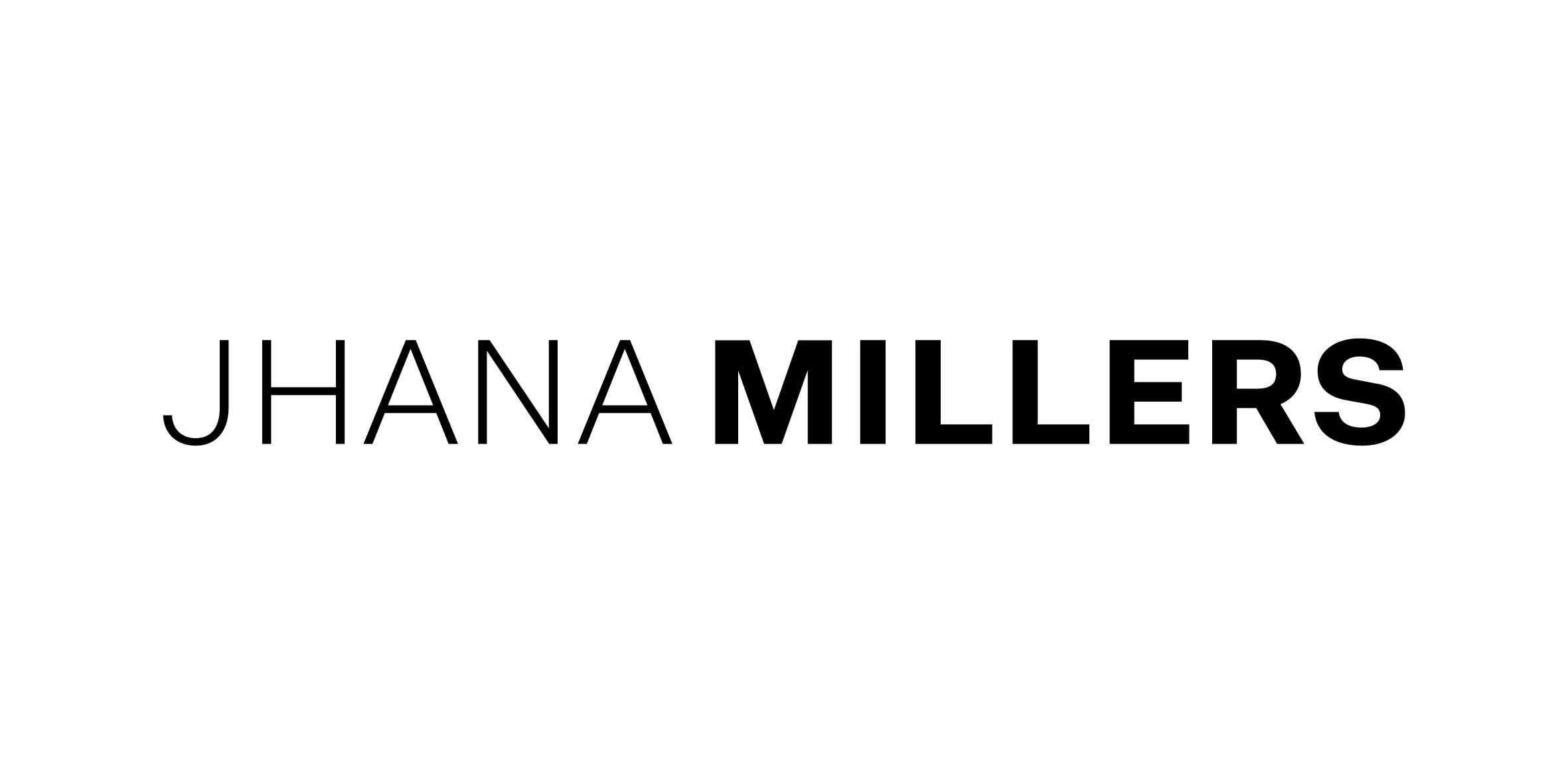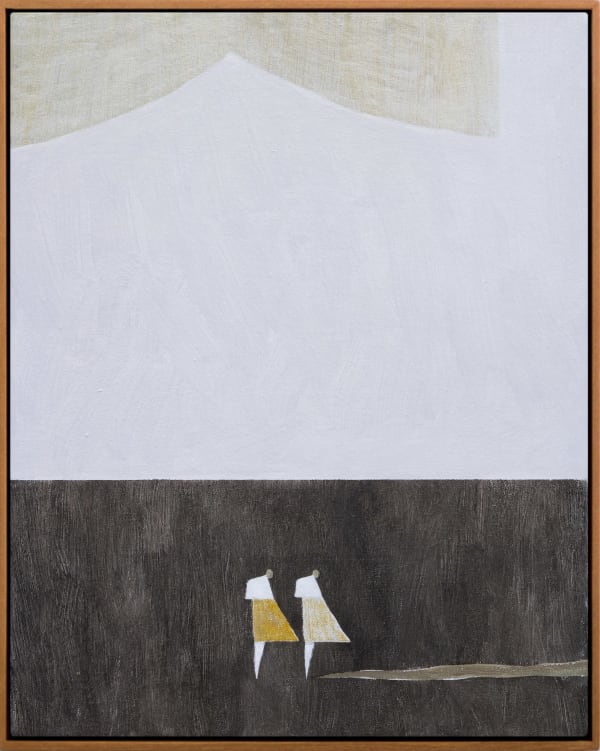Alan Ibell, DWELLINGS
Alan Ibell
DWELLINGS
11 May – 3 June 2022
Jhana Millers is pleased to present their fourth solo exhibition with Alan Ibell, DWELLINGS. In this new exhibition, Alan extends his longstanding interest in the correspondence and contrast between the internal and external facets of selfhood. Collectively, the works explore the gap between how one perceives oneself and how one is perceived by others.
The duality inherent in the works is signalled by the work titles as well as the familiar Ibellian figures — often painted as doubles. Domestic motifs of the house and the curtain also recur in the paintings, where their altered scale creates a sense of dislocation for the viewer — the foregrounded house is now a background; the curtain has been turned on its side to create the pitched roof of the house. Once again, we are forced to question what we see, and to impose our own narrative upon the paintings
The works in DWELLINGS advance Alan’s ongoing project of formal reduction and his exploration of the performative nature of viewing art. On more intimately sized canvases than those seen in his 2022 exhibition, ‘A New Mountain’, he invites us to meditate on the roles we assume and the spaces we inhabit in both our conscious and unconscious lives.
-
 Alan Ibell, The House of the Voyeur, 2023
Alan Ibell, The House of the Voyeur, 2023 -
 Alan Ibell, Quarry I, 2023
Alan Ibell, Quarry I, 2023 -
 Alan Ibell, The Mine, 2023
Alan Ibell, The Mine, 2023 -
 Alan Ibell, Meditation I, 2023
Alan Ibell, Meditation I, 2023 -
 Alan Ibell, Meditation II, 2023
Alan Ibell, Meditation II, 2023 -
 Alan Ibell, Quarry II, 2023
Alan Ibell, Quarry II, 2023 -
 Alan Ibell, Dwelling I, 2023
Alan Ibell, Dwelling I, 2023 -
 Alan Ibell, Dwelling II, 2023
Alan Ibell, Dwelling II, 2023 -
 Alan Ibell, Dwelling III, 2023
Alan Ibell, Dwelling III, 2023 -
 Alan Ibell, Dwelling IV, 2023
Alan Ibell, Dwelling IV, 2023 -
 Alan Ibell, Audience I, 2023
Alan Ibell, Audience I, 2023 -
 Alan Ibell, Audience II, 2023
Alan Ibell, Audience II, 2023
DWELLINGS
In this new exhibition, Alan Ibell extends his longstanding interest in the correspondence – and the contrast – between the internal and external facets of selfhood. Collectively, the works explore the gap between how one perceives oneself and how one is perceived by others, a theme Ibell sees as analagous to the subject/object relationship of the viewer and the object viewed – the painting. Is the painting what the external viewer perceives it to be? Can it appear to be one thing while also being another? What other painting-selves lurk beneath the surface of the outermost layers of pigment on the canvas? And what power does the viewer have to change the essence of the viewed work? These questions circulate behind the collection of works exhibited as ‘Dwellings’.
The relationship between viewing subject and viewed object is made explicit in the works that most directly invoke a theatrical setting, ‘The House of the Voyeur’ and the two ‘Audience’ paintings. In ‘The House of the Voyeur’, the familiar Ibellian figure stands in front of what appears to be a stage curtain, inviting us to judge his performance – until we realise that the blackness behind him may not be a stage backdrop but instead the darkened auditorium in which the audience sits. Are we looking at the figure or is he looking at us? Is the ‘House’ of the title the sparsely invoked physical location of the painting, or the diminuitive schematic house at the figure’s feet?
The motifs of the house and the curtain recur in the ‘Dwelling’ paintings, where their altered scale creates a sense of dislocation for the viewer – the foregrounded house is now a background; the curtain has been turned on its side to create the pitched roof of the house. Once again, we are forced to question what we see, and to impose our own narrative upon the paintings. That the ‘true’ narrative may never be grasped is gestured at by the ‘Audience’ works, in which the unembellished silhouetted heads both invite us to project identifying features onto them and defer this identification by underscoring the ultimate unknowability of another person’s consciousness.
This duality of experience is signalled not just by the doubled figures that circulate amongst so many of the works in the exhibition, constituting a visual metaphor for the subject-object dichotomy, or perhaps a depiction of the inner self observing the performed, external self. It also inheres within the punning, polysemous titles of the works, where a ‘dwelling’ can be either a living space or a verb form signalling rumination – or meditation, the meaning that surfaces in the titles of two further works. The works entitled ‘Quarry’ and ‘Mine’, similarly, seem to present location descriptors – but the nouns mask the words’ secondary role as verbs which invite a figurative interpretation. Both the viewer and the painted figures are mining or quarrying their surroundings for information and deeper understanding.
Taken together, the works in ‘Dwellings’ advance Ibell’s ongoing project of formal reduction and his exploration of the performative nature of viewing art. On more intimately sized canvases than those seen in his 2022 exhibition, ‘A New Mountain’, he ultimately invites us to meditate on the roles we assume and the spaces we inhabit in both our conscious and unconscious lives.















